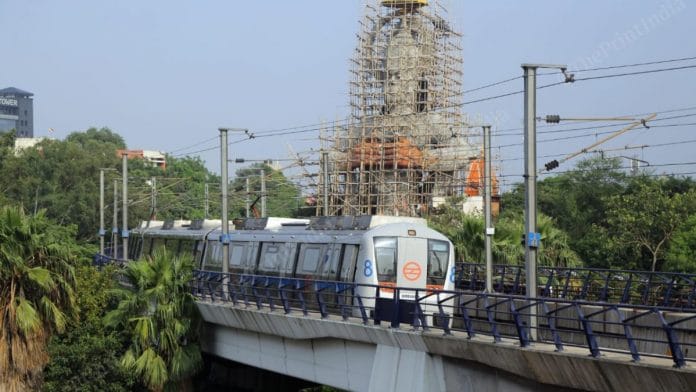New Delhi: Delhi Metro commuters could soon be able to avail air-conditioned electric feeder bus services for travel to and from the stations.
The Delhi Metro Rail Corporation (DMRC) has finalised two separate contracts with bus operators for induction of 100 AC buses by June this year to boost last-mile connectivity in the national capital, ThePrint has learnt.
According to the plan, 50 per cent of these 24-seater buses for each cluster will be delivered to both the operators, Vivek Travels Private Limited and Green One Drive, by April.
Confirming this, DMRC Chairperson Mangu Singh said these would be low-floor buses, with a floor height of 440 mm.
Officials in the corporation said these buses will run on 10 different routes, which are in the process of being finalised. The operators were shortlisted through an open tender that led to the selection of Vivek Travels and Green One Drive.
The fares, however, have not been fixed yet, said a senior DMRC official who is involved in the process.
The feeder buses that operated earlier ran on CNG. A senior DMRC official told ThePrint that these buses were not successful, and will be gradually phased out and replaced by electric buses.
Also read: No aid from Centre as Delhi Metro battles Covid losses of Rs 2,856 crore, DMRC chief says
Last-mile connectivity gap
Last-mile connectivity has always been a matter of concern for the commuters, with many living far away from stations.
It has also been a point of contention between the Delhi government, the central government and the DMRC for a while now.
In its efforts to plug this gap, the DMRC has been trying to adopt innovative, sustainable and cleaner modes of transport, senior officials said.
In February 2020, the Delhi Metro had extended the facility of e-rickshaw services to 12 more stations across the rapid transit network. The facility is now available at 29 stations, with an operational fleet of over 1,000 e-rickshaws.
According to a recent study by scientists from the CSIR-Central Road Research Institute, 39 per cent metro commuters reach stations on foot, while 35 per cent use cycle-rickshaws or e-rickshaws, 14 per cent private cars or cabs, 2 per cent two-wheelers and 10 per cent buses.
Over the last three months, several commuters submitted representations to the DMRC complaining that though the precautionary measures in place inside the trains and stations are comforting, they don’t feel safe after leaving the stations as they need to travel in e-rickshaws or auto-rickshaws to reach their destinations.
Following last year’s lockdown after the Covid outbreak, the Delhi Metro was shut for 169 days. Services resumed in September 2020 with strict guidelines in place, including limited capacity.
In its Monday meeting, the Delhi Disaster Management Authority (DDMA) decided that both the metro services and Delhi Transport Corporation buses will continue to run at limited capacity as preventive measure in the backdrop of surge in Covid cases in some states.
Also read: Travelling by Delhi metro? You can now get RAT or RT-PCR Covid test done for free at stations






